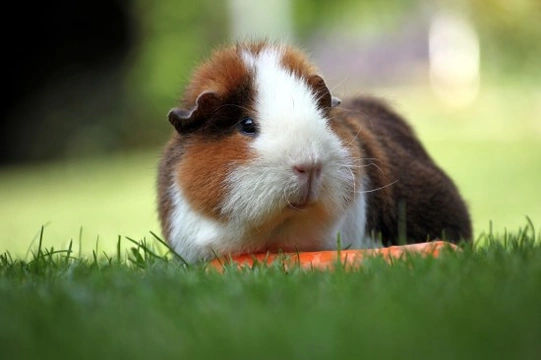
Guinea Pigs Do Better When Kept as Outdoor Pets
Guinea pigs are lovely little characters and when they are handled properly, they make wonderfully friendly pets. One thing most people don't realise is just how intelligent cavies actually are. In the wild there are eight species of guinea pigs but only one of these has become a popular domestic pet.
Another wonderful thing about cavies is they boast long lifespans which can be anything up to 8 years plus when they are well cared for and fed a correct, well-balanced and nutritious diet that contains plenty of fibre. If you are thinking about getting a couple of guinea pigs for the children and as family pets, you have to be prepared for the long-term albeit very enjoyable commitment that goes into sharing a home with these fascinating little creatures.
Cavies are Happier When Kept Outdoors
Guinea pigs can be kept as indoor pets, but they do that much happier when they are kept in an outdoor environment. They need lots of room and a secure outdoor run where they can graze just as they would in the wild. Not only does this provide a lot of stimulation for them, but it helps keep their teeth in good condition and well worn down.
If you do decide to keep a male and a female guinea pig together, you need to have the male neutered to avoid any unwanted pregnancies. You would have to check with your local vet to make sure they are able to neuter guinea pigs because not all veterinary surgeries offer this service. The other thing you need to bear in mind is that it takes a good four weeks after being neutered for male cavies to become sterile. In short, you would need to keep your cavies apart for this length of time.
When kept as outdoor pets, guinea pigs tend to live for that much longer, but hutches need to be very secure and provide lots of different compartments for your pet to explore and hide away in when they feel like it. Cavies like to have a nice quiet spot where they can nap which they tend to do a lot!
The best place for a guinea pig hutch is in a nice sheltered shed which has a safe, secure run joined on to it where your pets can be let out when the weather permits. However, it is never a good idea to leave cavies out when you are not around because it is just not safe to do so, not only because of the predator problem, but in the UK the weather can change very quickly and cavies are very vulnerable to extreme weather conditions.
Hutches should never be placed in garages that are being used to park any cars in because the exhaust fumes are highly toxic and will end up killing your pets. The other thing you need to bear in mind is that although cavies do that much better when they are kept as outdoor pets, they still need a lot more in the way of bedding etc during the colder winter months.
This means ensuring your cavies have extra of the following:
- Soft dust-free straw – no nutritional value but it provides extra warmth
- Hay – can be used as bedding but is also an important part of a guinea pig's diet
- Wood shavings, but these need to be dust-free and you should never use cedar shavings due to the fact they can make guinea pigs very ill
- Fresh, clean water making sure it hasn't frozen over
Making Sure Your Pets are Healthy
It's important to keep an eye on your pet's health over the winter months. One of the conditions they are prone to suffer from is bumblefoot"" which is a bacterial infection that causes their feet to become painfully swollen. The cause is typically due to dirty, soiled and damp bedding.
You also need to regularly check their eyes which should not be an issue if you interact with your pet every day. Cavies often get eye infections if their bedding is not a 100% dust-free.
Other health issues to watch out for include the following:
- Mange – you'll notice your pets have itchy scratchy skin
- Dental problems
- Obesity – a real problem over the winter months when cavies don't get to go in their runs as much as they do during the summer months
- Skin issues – again these conditions are typically a result of their environment not being kept clean enough
Grooming Over the Winter is Essential
Grooming your cavies is essential at any time of the year, but more especially over the colder, winter months. Longer haired piggies need a little more in the way of brushing otherwise their coats quickly get tangled and matted which makes life very uncomfortable for them.
Quick Facts About Cavies Worth Remembering
- Guinea pigs boast long lifespans and if well cared for can live up to 8 years plus
- Cavies like to live with others of their own kind in small groups or with another guinea pig of the same sex
- It's not a good idea to keep a breeding pair of cavies, it's far better to have the male neutered
- Guinea pigs and rabbits should not be kept in the same environment because a rabbit might end up bullying your cavy!
- Cavies need to be kept in ultra clean environments with dust-free bedding and lots of good quality hay so their digestive systems remain strong and healthy
- Guinea pigs need to have free access to fresh clean water at all times
""



